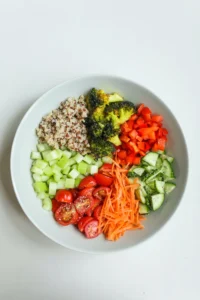Generated by Contentify AI

Introduction
Plant-based meal planning may seem daunting to beginners, but with the right approach, it can be an exciting and fulfilling journey. From exploring new ingredients to discovering creative ways to prepare delicious meals, the possibilities are endless. Embracing a plant-based diet is not only beneficial for your health, but also for the environment. By incorporating a variety of fruits, vegetables, whole grains, and legumes into your meals, you can create a diverse and nutrient-rich menu. With thoughtful planning and a sprinkle of culinary creativity, anyone can enjoy the rewards of plant-based meal planning. Whether you’re a novice or a seasoned pro, there’s always something new to learn and savor in the world of plant-based cuisine.
The Importance of Plant-Based Diets
In the blog section “The Importance of Plant-Based Diets” in the Plant-Based Meal Planning for Beginners, we delve into the significance of opting for a diet that is primarily based on plant-derived foods. This comprehensive exploration highlights the numerous health benefits associated with a plant-based diet, including improved heart health, weight management, and the potential to reduce the risk of chronic diseases. Furthermore, we discuss the environmental impact of plant-based diets, emphasizing the sustainable and eco-friendly nature of plant-derived food sources. By addressing common misconceptions and offering compelling insights, our aim is to inspire and empower individuals to embrace a plant-based lifestyle and reap the rewards it holds for both personal well-being and the planet.
Understanding the Basics of Plant-Based Nutrition
Understanding the Basics of Plant-Based Nutrition is a crucial section of Plant-Based Meal Planning for Beginners. Plant-based nutrition is not only a dietary choice but also a lifestyle that promotes overall wellbeing. By embracing a plant-based diet, you not only nourish your body with essential nutrients but also contribute to the sustainability of the environment. Delving into the details of plant-based nutrition allows beginners to comprehend the importance of incorporating a variety of fruits, vegetables, whole grains, and legumes into their meals. This section emphasizes the significance of balancing macronutrients, incorporating sufficient protein sources, and optimizing vitamin and mineral intake. It also emphasizes the benefits of reducing the intake of processed foods and embracing whole, natural ingredients. By understanding the basics of plant-based nutrition, beginners gain the knowledge and confidence to embark on a journey towards a healthier, more sustainable lifestyle.
Building a Balanced Plant-Based Plate
The key to building a balanced plant-based plate lies in incorporating a variety of nutrient-dense foods to ensure you’re meeting your body’s needs. Start by filling half your plate with colorful vegetables such as leafy greens, bell peppers, and cruciferous veggies like broccoli and Brussels sprouts. These provide essential vitamins, minerals, and fiber. Next, add a quarter of your plate with whole grains like quinoa, brown rice, or whole grain pasta to fuel your body with complex carbohydrates and fiber. Then, include a protein source such as beans, lentils, tofu, or tempeh to complete your plate. Lastly, don’t forget about healthy fats from sources like avocados, nuts, and seeds to support overall well-being. By following these guidelines, you can effortlessly create a well-rounded and satisfying plant-based meal.
Exploring Delicious Plant-Based Recipes
Introducing our “Exploring Delicious Plant-Based Recipes” section of Plant-Based Meal Planning for Beginners. Whether you’re a seasoned plant-based chef or just starting out, this section is designed to provide you with a wide array of mouthwatering recipes that will make your transition to a plant-based diet both delicious and satisfying. From vibrant salads to hearty mains, delectable snacks to indulgent desserts, our collection of recipes offers something for every craving and occasion. Get ready to embark on a culinary journey filled with flavor, creativity, and the joy of plant-based cooking.
Tips for Successful Plant-Based Meal Planning
Are you ready to elevate your plant-based meal planning game? Look no further! We have curated the ultimate guide to help you master the art of successful plant-based meal planning. From creating balanced and nutritious meals to incorporating a variety of flavors, textures, and nutrients, we’ve got you covered. Say goodbye to the hassle of last-minute meal decisions and hello to a week of delicious, satisfying, and wholesome plant-based meals. Get ready to embrace your inner chef as we dive into the tips and tricks for successful plant-based meal planning.
Embracing the Plant-Based Lifestyle
Embracing the plant-based lifestyle is a significant and rewarding choice for those looking to improve their health and make a positive impact on the environment. Transitioning to a plant-based diet can feel overwhelming, but with the right meal planning and guidance, it can be an exciting and fulfilling journey. By focusing on a variety of colorful fruits, vegetables, whole grains, legumes, nuts, and seeds, individuals can enjoy a delicious and nutritious assortment of meals while enhancing their overall well-being. Moreover, embracing the plant-based lifestyle opens up a world of culinary creativity, allowing individuals to explore new flavors, textures, and cooking techniques. Additionally, by incorporating ample plant-based protein sources, individuals can meet their nutritional needs and maintain muscle strength and energy levels. Ultimately, embracing a plant-based lifestyle not only benefits personal health but also contributes to creating a more sustainable and compassionate world for all.
Conclusion
The conclusion section of our blog, “Plant-Based Meal Planning for Beginners”, serves as a comprehensive wrap-up of the entire process of transitioning to plant-based eating. In this section, readers will find a concise summary of the key points discussed throughout the blog, reinforcing the importance of mindful meal planning and introducing plant-based foods into one’s diet. With a touch of wit and cleverness, the conclusion aims to leave a lasting impression on the readers, inspiring them to embark on their plant-based journey with confidence and enthusiasm.






